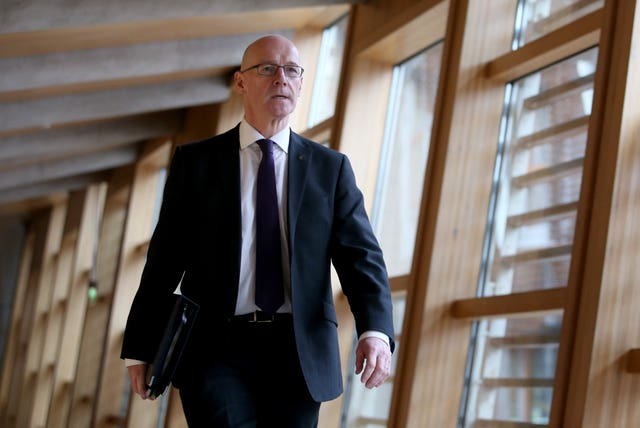Primary pupil assessments to be reformed after teacher feedback
Education Secretary John Swinney said changes will be made to ‘enhance the experience of both learners and educators’.

National assessments for primary pupils will be reformed following feedback from teachers, Education Secretary John Swinney has said.
A forum comprised mainly of P1 teachers has recommended a “clear national rationale” is published setting out possible purposes and uses of the tests.
It also recommends each school sets out its own specific purposes and policy for the tests, and staff make their own decisions about how and when they are conducted, and how the data is “woven into professional conversations about children, teaching and the curriculum”.

Further recommendations include stronger guidance on how teachers interact with and support children during the tests, covering how much help to give, what help not to provide, and when breaks would be appropriate.
The forum also recommends guidance on how the tests can be delivered compatibly with a play-based classroom, and making guidance available online.
The 22 recommendations are made in a report by the P1 Practitioner Support Forum, formed to give P1 teachers a voice on the tests.
Scottish national standardised assessments (SNSA) were introduced for P1, P4, P7 and S3 pupils in 2017 to help measure the attainment gap in schools.
But some teachers, education unions and all opposition parties oppose standardised tests for P1 pupils as the assessments are said to have left some youngsters in tears.
Mr Swinney said: “We will work to make immediate improvements where we can to enhance the experience of both learners and educators and ensure the assessments can continue to be delivered as part of everyday learning and teaching.
“Standardised assessments are an effective additional tool to support teacher professional judgment and identify next steps in a child’s learning.
“They can be particularly useful in the early years if we are to continue to close the attainment gap, although they remain just one part of the range of evidence a teacher can call on when assessing whether a child has achieved the appropriate CfE (Curriculum for Excellence) level.”
He thanked the forum for the recommendations, which he said are “grounded in the realities of teaching P1 and are informed by their own experiences and professional knowledge”.
Forum chairwoman Sue Ellis, education professor at Strathclyde University, said: “It has been a pleasure to work with the practitioner forum and it is important that people listen carefully to what these imaginative and experienced P1 teachers have to say.
“They offer plenty of good ideas about how to make the SNSAs work in practice and the report contains useful advice as well as recommendations for the future.”
Opposition parties criticised Mr Swinney for failing to wait for the outcome of an independent review into the P1 tests he commissioned following a parliamentary vote to scrap them, which is non-binding on the Scottish Government.
Scottish Labour education spokesman Iain Gray said: “This is absolutely farcical from John Swinney, and the latest example of him completely botching an issue in the education brief.
“The will of the Scottish Parliament is quite clear – it voted to scrap these tests for primary one pupils.
“Not only has John Swinney ignored that for months, he is now ignoring his own independent review by pre-empting it.”
Liz Smith, Scottish Conservative education spokeswoman, called on Mr Swinney to scrap the tests in line with the vote.
She said: “We listened to the voices of teachers and educationalists before that vote, and they did not see P1 tests as standardised or delivering meaningful results.”
The Scottish Liberal Democrats said more guidance is the “last thing” teachers want.
A Scottish Government spokeswoman said changes from the forum recommendations are “to improve practical advice for teachers when planning for and administering the assessments over the coming weeks”, as most will take place in May and June.
She added: “The independent review will take any recommendations from the forum into account, however its remit is much wider, focusing on the compatibility of assessments with CfE, the usefulness of the diagnostic information the assessments provide and the future of the assessments.”





